One of the central icons of the celebration of Christmas is a nativity scene, with its tableau of three persons: Mary, Joseph, and Jesus. In fact, a nativity scene often includes a second tableau of three persons: the Three Wise Men. But for many of us who have lived in Fort Worth a long time, Christmastime recalls still another tableau of three persons, although decidedly more secular: the three street vendors who populated a downtown corner more than forty years ago.
Perhaps we recall the three vendors at Christmastime as we remember Christmas shopping downtown and the people and places and customs that are no more. Perhaps we recall the three vendors at Christmastime as we listen to a Christmas song that immortalized—but did not identify—one of the three:
“Crowded street, busy feet, hustle by him
Downtown shoppers, Christmas is nigh.
There he sits all alone on the sidewalk
Hoping that you won’t pass him by.”
The “him/he” of that song was Frankie Brierton.
Completing the tableau of three on the corner of that “crowded street” with its “busy feet” was husband-and-wife missionary team Herman and Sylvia Douglas.
From the late 1950s into the late 1970s the sight—and sound—of Brierton and the Douglases was familiar to anyone who worked or shopped downtown. The “office” of Brierton and the Douglases was the sidewalk at the entrance of Leonard’s Department Store at the corner of Houston and West 2nd streets.
The location of that office was ideal for the three vendors. Before malls, before Amazon and eBay, when people still shopped downtown, that corner was a consumer crossroads. In addition to Leonard’s, nearby were Everybody’s, Stripling’s, and Monnig’s department stores, the five-and-dimes such as Kress, and dozens of smaller retail shops.
And Fort Worth residents weren’t the only people who shopped downtown. As the nearest big city, Fort Worth drew shoppers from surrounding counties.
In a typical business day hundreds of “busy feet” hustled past Brierton and the Douglases. At Christmastime the busy feet numbered in the thousands.
Frankie Brierton was crippled by spinal meningitis. The Douglases were blind. Unable to work at most jobs, they earned a living as best they could. Brierton sold pencils and, at Christmastime, “pretty paper, pretty ribbons of blue.” The Douglases sold pencils and matches as they sang hymns and played harmonica and guitar.
The management of family-owned Leonard’s Department Store allowed Brierton and the Douglases to occupy the sidewalk by a store entrance even as other nearby retailers complained.
“Some people wanted them moved out, but we never moved them,” retired Leonard’s store manager Charlie Ringler told Star-Telegram columnist Bud Kennedy. “We couldn’t turn them away. As long as they were selling pencils or something, that was fine.”
Would merchants today allow such vendors?
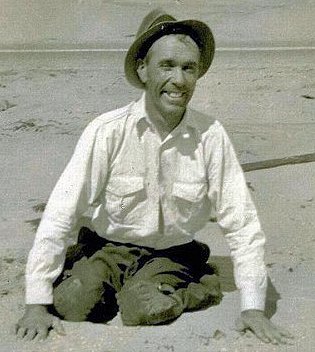 Much of what we know about Frankie Brierton comes from Bud Kennedy’s reporting. Brierton was born in Santo in Palo Pinto County in 1899. His legs weakened by spinal meningitis when he was a child, he early on compensated with fortitude. No wheelchair for him. He learned to get around on his hands and knees. (Photo from the Daily Mail.)
Much of what we know about Frankie Brierton comes from Bud Kennedy’s reporting. Brierton was born in Santo in Palo Pinto County in 1899. His legs weakened by spinal meningitis when he was a child, he early on compensated with fortitude. No wheelchair for him. He learned to get around on his hands and knees. (Photo from the Daily Mail.)
Rancher Bob Neely of Santo recalled his former neighbor to Kennedy: “You could always hear him in town, dragging himself along the gravel street.”
Likewise, Brierton dragged himself along the sidewalk outside Leonard’s Department Store through a forest of legs as able-bodied pedestrians towered over him. On his hands he wore heavy gloves. On his knees he wore pads fashioned from automobile tire tread. On his back he wore a leather vest that had a pencil rack and coin box fastened to it.
 In the 1940 census Brierton listed himself as a “salesman” of “novelties.”
In the 1940 census Brierton listed himself as a “salesman” of “novelties.”
Brierton earned a living without government assistance, his daughter, Lillian Compte, told Kennedy.
“He sold pencils. He crawled around on his hands and knees. But we never did without,” Compte said.
Yes, Frankie Brierton was physically challenged, but he got around, commuting from Santo to that corner of Houston and West 2nd streets. He drove a car outfitted with hand controls. Brierton also sold pencils at the state fair in Dallas, at the stock show in Fort Worth, and in Houston, Compte told Kennedy.
Frankie Brierton got around in other ways, grandson Rick Compte told Kennedy: Brierton was married seven times.
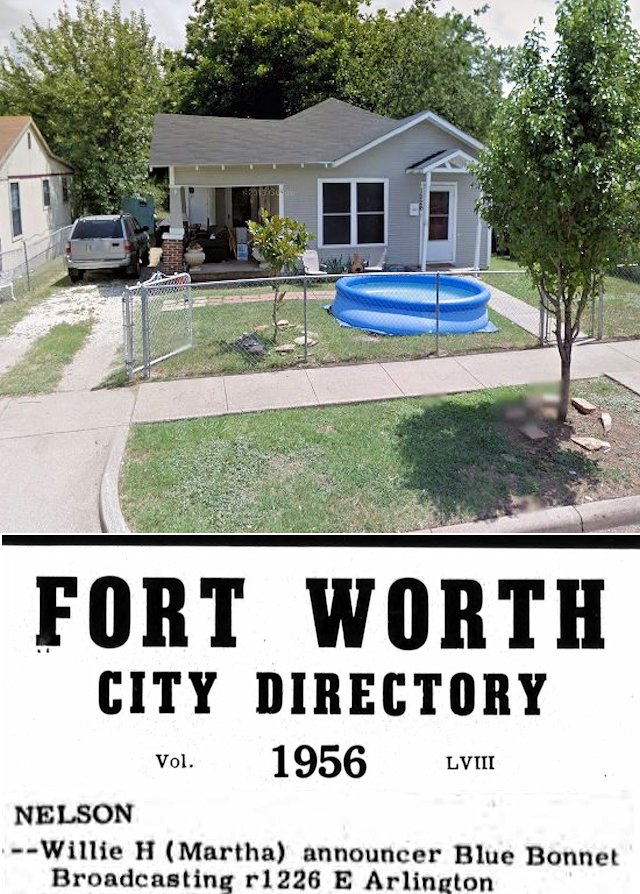 One of the people whose “busy feet” hustled by Brierton as he sat “all alone on the sidewalk” was struggling singer/songwriter Willie Nelson, who lived in Fort Worth for a while during the 1950s. In addition to performing on Jacksboro Highway and Exchange Avenue, Nelson worked as a deejay and a door-to-door seller of vacuum cleaners and encyclopedias.
One of the people whose “busy feet” hustled by Brierton as he sat “all alone on the sidewalk” was struggling singer/songwriter Willie Nelson, who lived in Fort Worth for a while during the 1950s. In addition to performing on Jacksboro Highway and Exchange Avenue, Nelson worked as a deejay and a door-to-door seller of vacuum cleaners and encyclopedias.
Fast-forward to 1963. Nelson had moved to Nashville. One day a memory from his Fort Worth days came to him: the poignant scene of the crippled street vendor hawking “pretty paper” outside Leonard’s Department Store at Christmastime.
According to Texas Monthly, Nelson wrote the song in twenty minutes. Nelson said, “It was an easy song to write. The easy ones write themselves.”
Roy Orbison recorded “Pretty Paper” in time for Christmas 1963.
Roy Orbison knew a good song when he heard one. And, like Willie Nelson, he had lived in Fort Worth.

Roy Kelton Orbison was born in Vernon, Texas to Orbie Lee Orbison, an oil well driller and auto mechanic, and Nadine Vesta Shults, a nurse. During the Depression Orbie Lee and Nadine were unemployed and in 1942 moved the family to Fort Worth to find work.
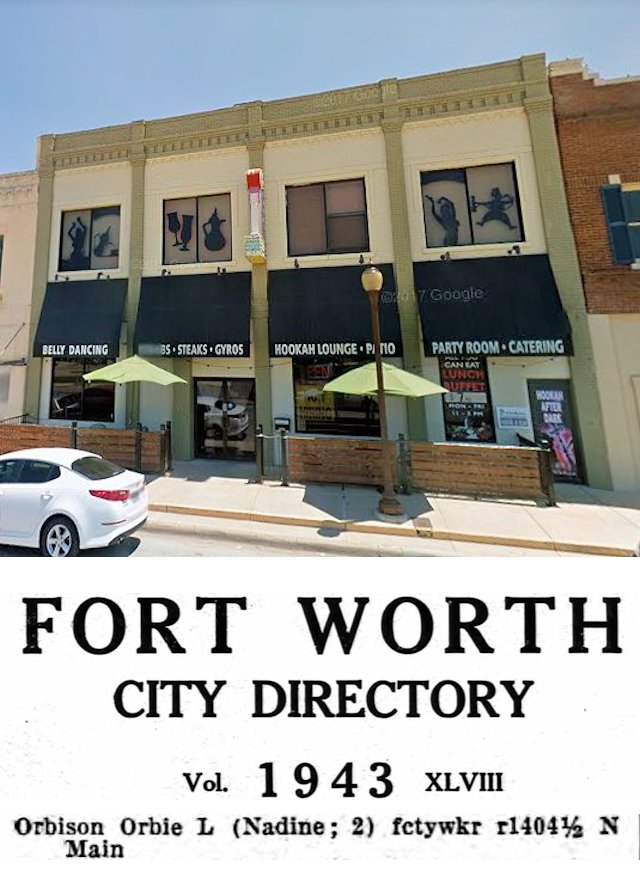 Orbie and Nadine indeed found work: at the bomber plant. The family rented rooms upstairs in the Pritchard Building (1906) at 1404 North Main Street.
Orbie and Nadine indeed found work: at the bomber plant. The family rented rooms upstairs in the Pritchard Building (1906) at 1404 North Main Street.
 In 1945 the Orbisons lived at 1319 North Calhoun Street.
In 1945 the Orbisons lived at 1319 North Calhoun Street.
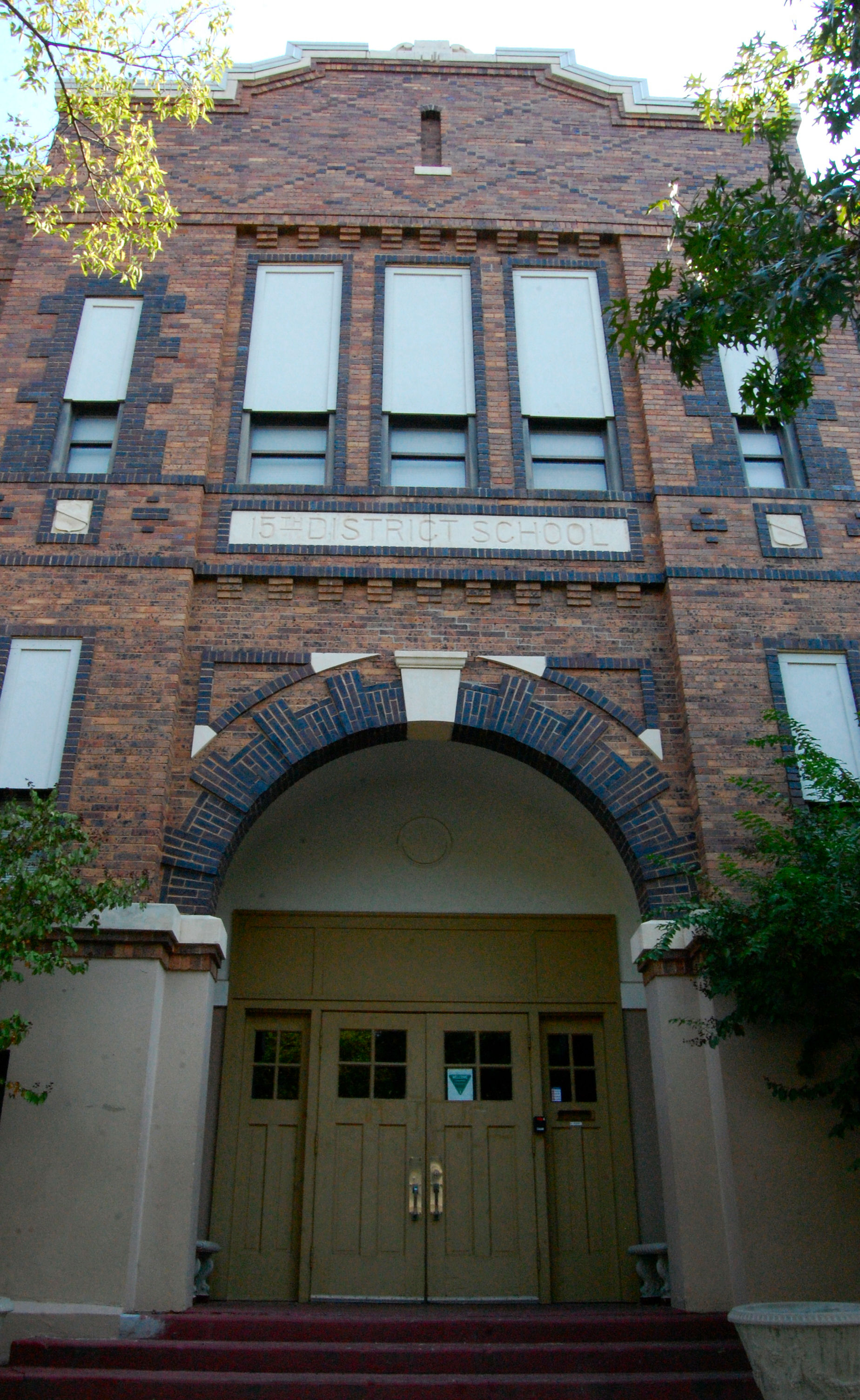
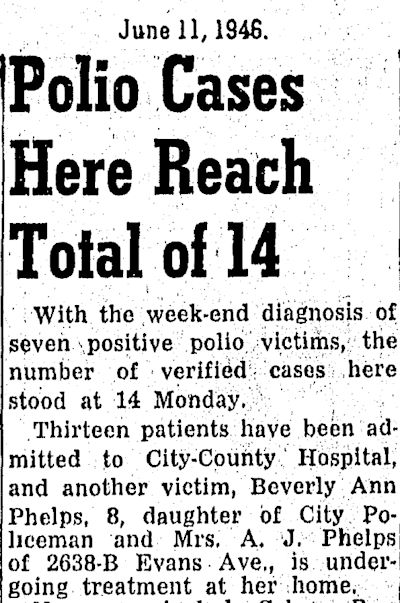 Roy attended nearby Denver Avenue Elementary School until about 1946, when a polio scare prompted the Orbison family to return to Vernon. Roy was ten years old. (The school, originally “15th District School,” has been renamed “Rufino Mendoza Sr. Elementary School.”)
Roy attended nearby Denver Avenue Elementary School until about 1946, when a polio scare prompted the Orbison family to return to Vernon. Roy was ten years old. (The school, originally “15th District School,” has been renamed “Rufino Mendoza Sr. Elementary School.”)
 “Specialty salesman” Frank Napoleon Brierton, who sat
“Specialty salesman” Frank Napoleon Brierton, who sat
“all alone on the sidewalk
hoping that you won’t pass him by,”
died in 1973 unaware that he had inspired the song “Pretty Paper.”
Frankie Brierton shared that corner of fortitude and faith outside Leonard’s Department Store with Herman and Sylvia Douglas.
Herman and Sylvia were born in 1908. Sylvia lost her sight in one eye in an accident when she was nine. Surgery to save her other eye failed, leaving her blind. She attended Texas School for the Blind and learned to read Braille. She was working at Lighthouse for the Blind in the late 1950s when she met Herman Douglas, who had been blind since his thirties. They were married, and Herman asked Sylvia to join him as a singing street missionary.
“When I started working with him,” Sylvia recalled, “my whole heart and soul got into it. When I was a little girl I wanted to be a missionary. When Herman asked me to work with him I realized it was God’s will.”
“We would go out at 8:30 in the morning and sit in folding chairs outside . . . Leonard’s Department Store and sing until three o’clock. I gave away religious tracts and had pencils for people who wanted them. . . . We never asked anyone for money, and I was never ashamed of what I was doing. You don’t get embarrassed about what the Lord asked you to do.”
Passersby would drop coins into the Douglases’ cigar box, prompting Sylvia to ask those unseen customers, “Would you care for some pencils or some matches?”
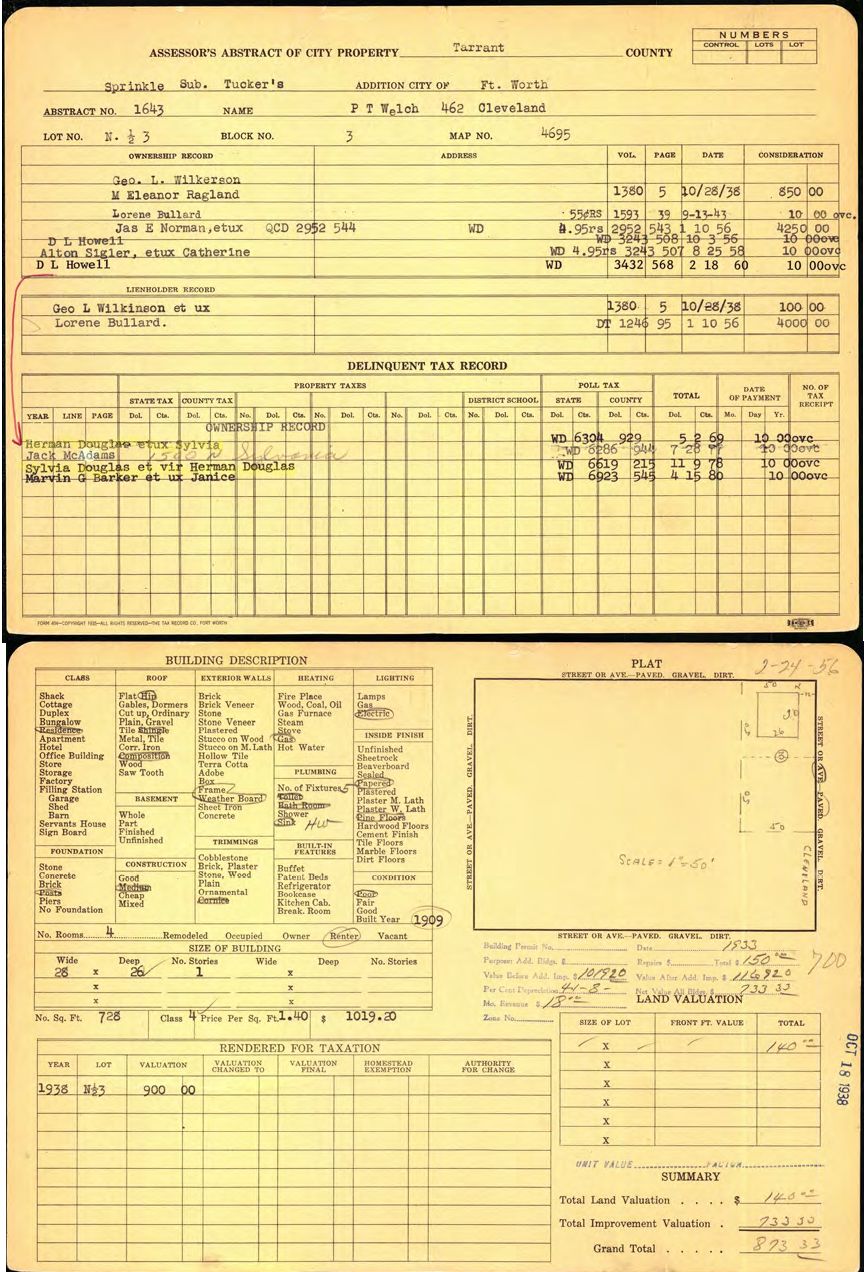 The Douglases lived south of downtown at 462 Cleveland Street in a house of 728 square feet built in 1909. But the house had a good location for the Douglases’ commute to the sidewalk outside Leonard’s Department Store: Cleveland Street was just one block from a bus stop on Main Street.
The Douglases lived south of downtown at 462 Cleveland Street in a house of 728 square feet built in 1909. But the house had a good location for the Douglases’ commute to the sidewalk outside Leonard’s Department Store: Cleveland Street was just one block from a bus stop on Main Street.
For the Douglases life at times seemed to add insult to injury: Herman was arrested for vagrancy. Federal authorities tried to revoke the Douglases’ welfare checks because the couple earned money on that sidewalk ($8 a week, Sylvia told the Star-Telegram). They were robbed at least once. Someone killed their service dog.
Through it all they kept the faith.
It was that faith that they sang about on the sidewalk outside Leonard’s:
“Rock of ages, cleft for me . . .”
“Just a closer walk with thee . . .”
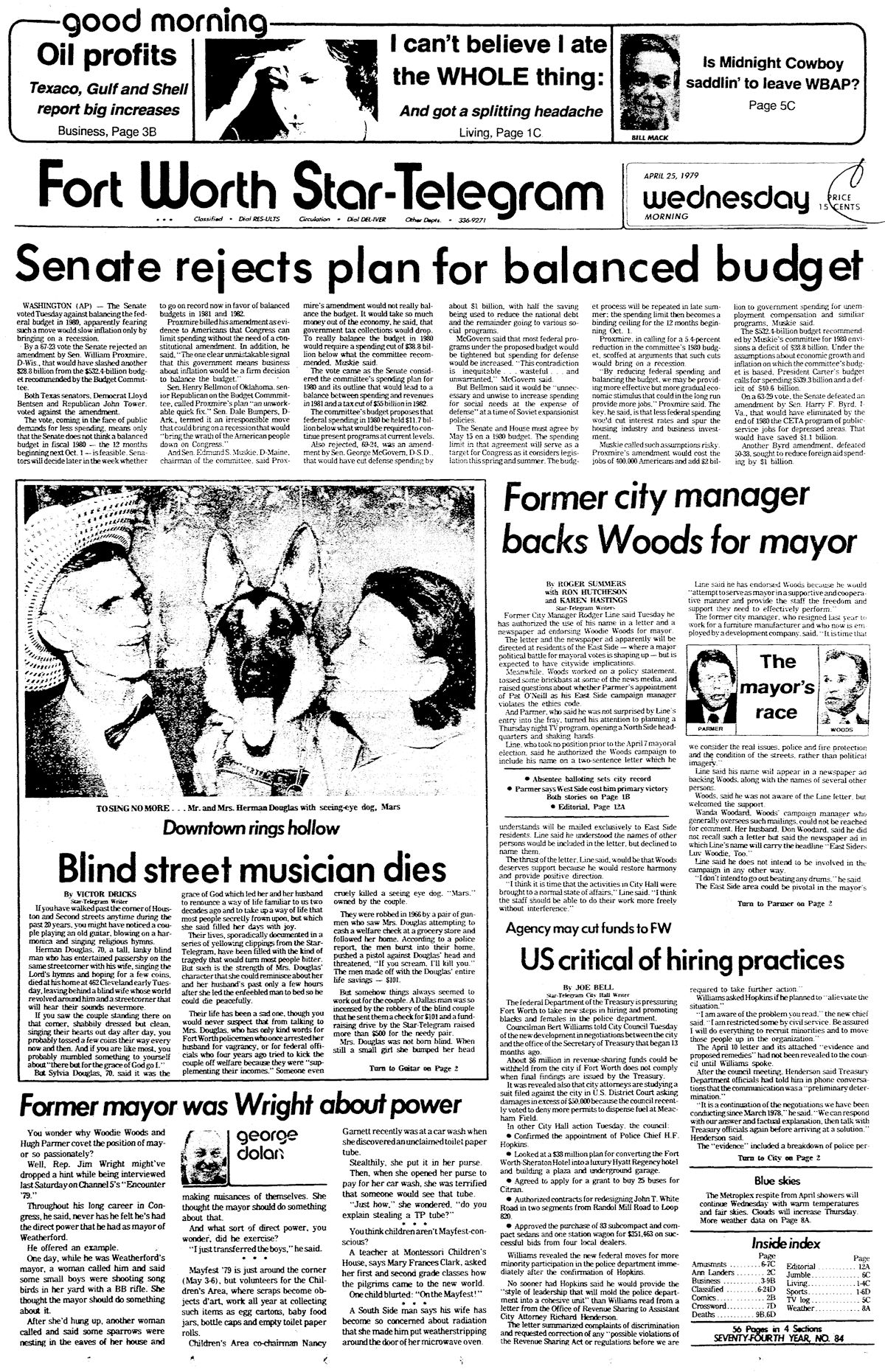 Life for Herman Douglas remained hard until the end: On the day he died in 1979 he had planned to pawn his guitar for $15 to buy groceries for himself and Sylvia.
Life for Herman Douglas remained hard until the end: On the day he died in 1979 he had planned to pawn his guitar for $15 to buy groceries for himself and Sylvia.
After Herman died, Sylvia continued their missionary work—at a different corner: the flea market at the intersection of University Drive and Jacksboro Highway.
 Sylvia Douglas was the last survivor of that tableau of three we remember on that street corner where “busy feet” hustled by so long ago. Fittingly, she died during the Christmas season: December 4, 1988. She was eighty. Herman and Sylvia are buried in Emerald Hills Cemetery in Kennedale. (Photo from Find A Grave.)
Sylvia Douglas was the last survivor of that tableau of three we remember on that street corner where “busy feet” hustled by so long ago. Fittingly, she died during the Christmas season: December 4, 1988. She was eighty. Herman and Sylvia are buried in Emerald Hills Cemetery in Kennedale. (Photo from Find A Grave.)
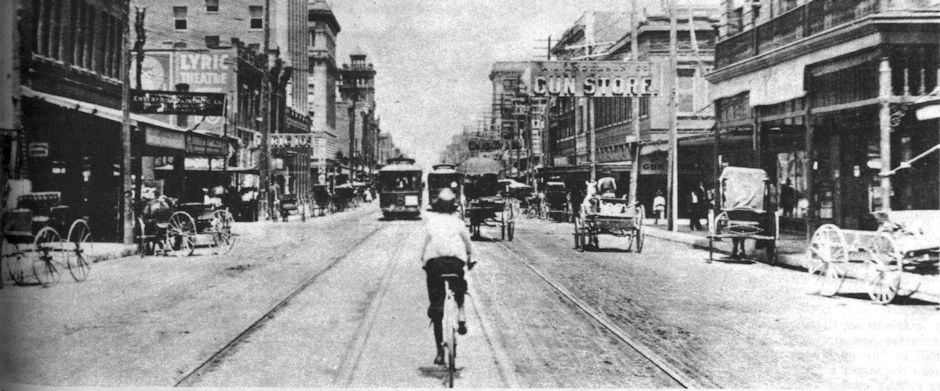





How well I remember Frankie Brierton. I was a little boy and saw him often on the street by Leonard’s Dept Store. My Mom bought three pencils from him once in the mid-fifties and those pencils were still in the drawer of her old Singer sewing machine when she passed in 1976.
I remember well, these folks playing and selling their items. I never knew there stories or names until now, but every time I hear Willie sing Pretty Paper, I think of them. Thanks for enlightening me.
I remember these people on the sidewalk by Leonard’s downtown. As a child, I remember that they were kind and definitely did not
“beg” anyone. I am so glad to read their stories. What a lesson in humility.
Will Nelson wrote a book “Pretty Paper” that told some of this story. He wrote and published a Christmas song with the same name. Thanks for sharing more information.
Awesome story that I will share with my children
Thanks, Grant.
Precious, but sad story. It is awesome how they relied on God and His Grace, to live in those poor circumstances. Now they are rejoicing in heaven, with all of God’s riches.??